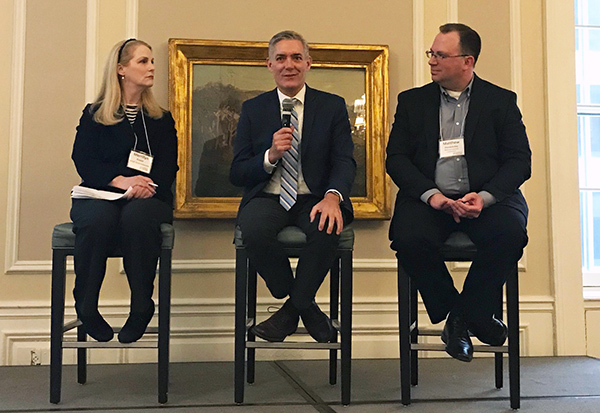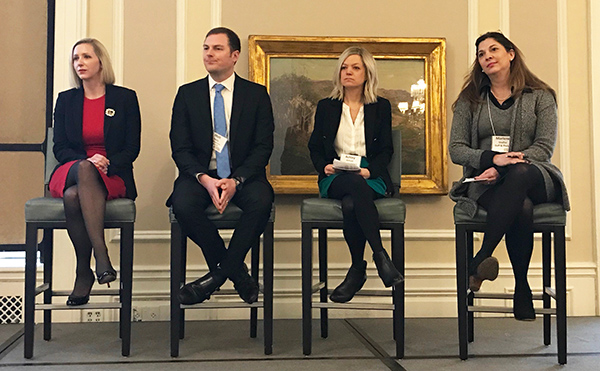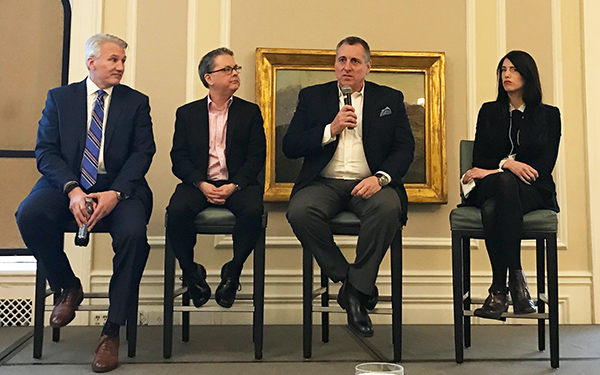On Thursday, February 14th the Gramercy Institute hosted the Financial Marketing Intelligence Event 2019: The Year Ahead in Financial Marketing at the Union League Club in Chicago.
This half-day forum, chocked full of panel sessions, presentations, and open discussion among senior financial marketing executives, served as an industry touchstone on topics integral to financial services marketing in 2019 – and beyond.
Gramercy Institute CEO & Chief Analyst, Bill Wreaks, opened the event noting that the exuberance felt at this time last year has changed and given the current volatility marketers must have good reflexes; that smart marketers will do very well and the strong demand for trusted and effective financial products and services requires marketers to create authentic branding and storytelling.
What About Fake News?
The opening panel session, Making Media Matter in a “Fake News” World, featured financial industry executives Merrillyn Kosier, CMO of Ariel Investments, Andy Seibert, Managing Partner at Imprint, and Matt Doubleday, CMO of Wintrust Financial Corporation.
This panel addressed questions regarding the connectivity of marketing content, fake news, and client trust in financial services.
Is fake news a real thing and does it materialize through intent or negligence? How do smart financial services marketers cut through the noise?
 Matt Doubleday observed that one factor contributing to “fake news” is a lack in journalistic bandwidth; that journalists are asked to do more with less in a flawed profit-first, story-second model.
Matt Doubleday observed that one factor contributing to “fake news” is a lack in journalistic bandwidth; that journalists are asked to do more with less in a flawed profit-first, story-second model.
And while there is a clear difference between editorial journalism and financial reporting, it is much harder for financial services firms to change their story or “walk it back” when they mess up.
Lacking surprise that those who get their news from sources like Facebook may be subject to fake news, Ms. Kosier pointed out that in financial services, there’s luckily industry guardrails in place to help keep the facts straight.
“Being in a heavily regulated industry can be a good thing. It ensures firms are truthful and straightforward on performance reporting and other key statements geared to investors,” she said. “As financial marketers, we file our work with FINRA. This industry requirement helps to ensure communication and advertising copy across the board is fair and balanced.”
So, what is the special opportunity marketers have in the financial space in 2019?
“There’s a historic lack of two-way communication where financial services have talked at consumers,” cited Andy Seibert, “Financial service marketers have a tremendous opportunity to listen, to not necessarily tell too much of the story, and to just tell the right story.”
Marketing, Financial Services, and Trust
In financial services trust is built from the brand up. And the foundation of any trustworthy brand is honesty.
Ms. Kosier explained that no financial brand would want a dent on their reputation that would lead to the erosion of client trust. A brand depends on getting its story right, so, in short, “Follow 2 rules: Rule #1 Always tell the truth. And rule #2, don’t forget rule #1.”
As financial marketers work to shape content to tell the firm’s story, it is the authenticity of the story that helps shape client trust. These days consumers and clients are better at detecting disingenuous stories and messages, especially from financial firms.
Matt Doubleday added, “When it comes to client trust, you have to assume it just isn’t there – because as a marketer you have to earn it every single day.” He then added that smart marketers communicate their firm’s story to clients in a clear, genuine and jargon-free way.
A Focus on Financial Branding
Next on the event docket was a presentation by Investing Channel founder & Executive Chairman, Bob Verrico who covered key components of how the firm conducts audience-based marketing (ABM), followed by the panel The Financial Brand: Why It Matters in 2019 – and Beyond.
This panel featured Tara Giuliano, Head of Client & Product Marketing at Nuveen, Matt Perry, Marketing Manager at BMO Global Asset Management, Ashley Allison, Senior Marketing Manager NA at Aviva Investors, and Marlene Shaffer, Head of Brand & Creative at Duff & Phelps.

Exploring different angles of what defines branding excellence and how brand equates to company culture, the panelists provided some great responses.
How important is brand authenticity for future financial services clients and investors?
Tara Giuliano cited that brand authenticity is more than just telling a brand story; that a firm must also live it. When everyone organization-wide lives and tells one story, this is branding through culture that will resonate externally now and into the future.
Echoing the sentiment of living a brand’s core values, Ashley Allison noted that a brand equates to culture through the equation of what you do X what you say = brand.
Financial Services Marketing Excellence
The panelists also discussed key components of financial services excellence.
“Add personalization to the list”, said Matt Perry, “Money is personal. Trust is personal. A brand can be personal even in the way someone receives insight from a financial advisor; for example, through a very personal medium such as a podcast.”
Also addressing personalization in marketing excellence, Marlene Shaffer pointed out that a financial firm’s responsiveness and agility to market in a way that addresses a client’s unique needs and situation is also crucial.
The next presentation given by Andy Seibert, Managing Partner of Imprint and Meg Staknis, Managing Director of Imprint covered the technical necessity of developing Journey Maps to inform marketing.
Financial Services Lead Generation
The final panel presentation, Lead Gen: Best Practices in Connecting with the Right Prospects featured David Partain, CMO of Flex Shares Exchange Traded Funds, Shane Stiles, President of Gate 39 Media, Bob Verrico, Founder & Executive Chairman of Investing Channel, and Chelsey Krull, Director – Retail Marketing at CME Group.
 This group of experts discussed both the technical and theoretical changes taking place in financial services marketing.
This group of experts discussed both the technical and theoretical changes taking place in financial services marketing.
“The concept of B2B marketing and B2C marketing is outdated; at the end of the day you’re speaking to people,” said Chelsey Krull. “As marketers, the future will be in pushing the production of products, services, and content ever-closer to the moment of demand.”
The ways that financial marketers reach their targets have changed. Technology has helped shape the personalized nurture journey.
David Partain points out that to stand out from the crowd a client must be engaged by an advisor or firm more than the once-a-year meeting.
“The ground game is over.” said Bob Verrico, “Data and technology allow us to use a non-ground game approach to reach people.”
Shane Stiles notes that to cut through the noise in financial services marketing in 2019, inbound generation and content that can evolve to support the goals of the customer journey are key. Leveraging automation tools that usher leads to the very doorstep of sales is happening fast through technology.
The panelists were also asked how they foresee lead generation marketing changing in the next five years. Each response revolved around the ability of technology to escalate the user experience; from micro-messaging, to AI and chatbots that can collect user data into a CRM.
Formulating Financial Marketing Success
Bill Wreaks of Gramercy Institute closed the event with a group discussion on the financial marketing formula for success and what makes an effective team.
The crowd of financial marketers were enthusiastic to offer up several points that contribute to success, including a team with a range of viewpoints, accessibility to marketing data, and key support from upper management on marketing initiatives.
The day’s forum provided a unique opportunity to glean insight from seasoned financial marketing executives into the changes and expectations in marketing in the coming year – and beyond.
—
To learn more about Gramercy Institute’s series of events focused on financial marketing, visit www.gramercyinstitute.com
